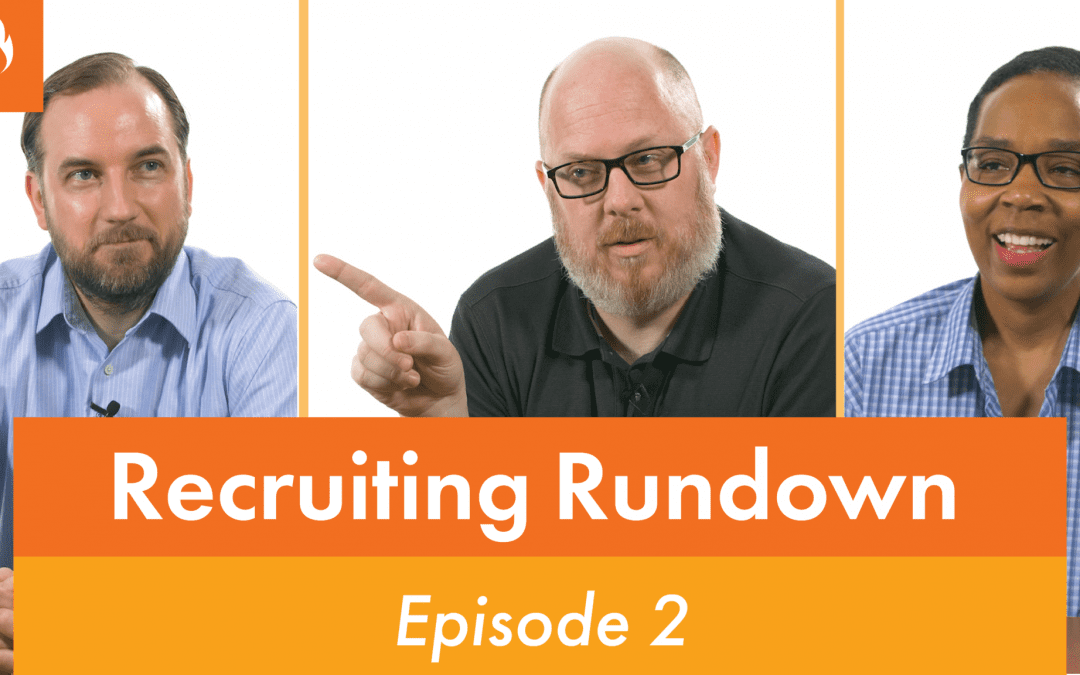
Season 3, Episode 2:
The Top Killers of
Candidate Experience
4 Things that Demolish Candidate Experience
Building too much rapport
Scott recognized that building rapport with candidates is an essential piece to positive candidate experience. But, unfortunately, sometimes being too friendly can result in a lost placement.
“A mistake that a lot of hiring managers make… they’re trying too hard to build a relationship and that’s usually when they stick their foot in their mouth.”
Scott’s reference is to a truly horrific moment when, after an interview ended, a hiring manager asked a female candidate when her baby was due.
She wasn’t pregnant.
What others might feel is a totally innocent and friendly remark could easily turn a great situation into a really bad one. Scott reminded us that candidates are interviewing hiring managers just as much as they’re interviewing candidates. “A comment that’s made in the lobby after the interview is over is just as detrimental as a comment that’s made in the interview room.”
The “who wouldn’t want to work for us?” mentality
Everything comes down to choice, regardless if a candidate is actively or passively interviewing, “… and that choice could be to not come and work for you,” Scott said.
You know that old habit of sticking to an interview script and reading the same questions over and over? And then when the interview is done you say, “Okay, do you have any questions for me? No? Great, we’ll call you”? Well, Scott was here to tell us that it’s a habit worth breaking, fast. Instead of focusing on a script and offering up the same old bland, one-sided questions, “you have to highlight the benefits and the opportunities within the company… if you don’t do that, the candidate leaves that interview not really feeling comfortable with the organization itself or what’s next for them.”
If you don’t make the candidate your focal point, “it just creates a really poor experience for any candidate… and prevents people from oftentimes accepting a follow-up interview or even a job.”
When companies and clients flip-flop
Even the most confident clients don’t always know what they’re looking for in a role. According to Tim, that’s his top killer of candidate experience.
Nobody wants to bring in someone for an interview and find out, within minutes, that it’s not a good fit. And not just in reference to skills, but even culturally. You can’t just shut down an interview ten minutes into it. At that point, you’re just going through the motions. “You’re wasting the client’s time and you’re wasting the candidate’s time.” And in this business, nobody’s got time to waste time.
“You want to help [candidates] further their career, get in a better spot, and you want the client to be happy with their employees. You want them to be there for as long as possible.” You can say goodbye to all of that if you’ve got a client who simply doesn’t know up from down.
Being too sales-y
The “sleazy car salesman” approach is aggressively self-serving, and while recruiting does have its similarities with sales, the strategies differ. Mary Ann described an all-too-familiar scenario: “If someone called me out of the blue and said ‘Hey, Mary Ann! I have this great job for you!’ I would immediately hang up.”
It’s true though: May Ann does want to talk about why the role could be a good fit, but she doesn’t want to force it like the sleazy salesman would. She just wants to engage in a conversation to see if it’s the right step in their career. For over 10 years, Mary Ann has successfully approached these conversations by simply putting herself in the candidate’s shoes (more on that in a sec).
5 Ways to Win the Candidate Experience
Pay attention to the details
Communication shouldn’t slow down once the candidate is on his way to an interview.
Scott described a time when a colleague coordinated travel and lodging for an out-of-state candidate. When the candidate landed at 10:30 p.m., the recruiter reached out to him. All she did was send a quick text passing on the confirmation number for his hotel, information about his rental car, and her cell phone number. He likely had all of that info in an email, but the candidate voiced how impressed he was that she paid that much attention.
Yeah, your job is to make a placement and not be the candidate’s BFF, but it’s also your job to make candidates feel supported. Interviews are nerve-wracking and when someone’s been communicating with the same person regarding the interview itself, it’s comforting to know that person is with them every step of the way.
Put yourself in the candidate’s shoes
Okay, back to Mary Ann’s point about the sleazy salesman.
She explained that, by putting herself in the other person’s shoes, it changes the dynamic from a negative one to a positive one. She described that initial cold calling as being “thrown to the wolves.” You only have a small window of time to establish a relationship over the phone until the questions pour in:
Who are you?
What company are you calling from?
How’d you get my phone number?
Why are you calling me? I already have a job.
She recommended that other recruiters take an approach like this: “Listen, I know you already have a job. My name is… I’m a recruiter and I saw some information about you on the internet about your background. I’m not asking you to jump ship–just asking for a brief conversation with me and that’s it.” That strategy takes “the walls down” and immediately illustrates her empathy for the person on the other line.
Scott has a similar recruitment approach: “It’s my job to make sure they’re knowledgeable, comfortable, and prepping them for the interview so that way it’s not just that they answer 10 questions and don’t have anything to ask.” He understands what it’s like to be unprepared. He’s been there, done that, and it sucked. So he makes sure not to put candidates in those types of situations. He recommended the same to all recruiters.
Meet with every candidate
You can get to know candidates a lot faster when you put a face to the voice over the phone, Tim said. So, he suggested that other recruiters should make a point to meet with candidates either via Skype/video or in person. “When I meet somebody, I not only talk to them about their skills, their background, and what they want to do, and would their personality fit with the client.”
He acknowledged that this might not be the most common practice, but it’s been promising for him in his seasoned recruiting career.
Work closely with clients and hiring managers
Depending on the client, Tim makes a point to sit in on interviews. He explains that he’s “usually just taking notes… I want to know what certain managers ask… what style because sometimes I’ll talk to a candidate and say ‘okay, this manager, he’s very laid back, very conversational–he’ll just ask you some questions but it’s just going to be more like you’re talking to a buddy.’
Other managers are very direct. He’ll tell candidates, “You need to answer this, you need to answer that, you might have to get examples, elaborate… you have to know your stuff.” Because he works so closely with clients and therefore hiring managers, he gets a good feel for them just based on general interactions. That way, when he does meet with candidates, he has a concrete outline to better prepare them for the next steps.
Keep in touch
Just because a candidate isn’t interested or it’s (seemingly) not the right time, you should never go silent.
Mary Ann told a story about how she came across a stellar candidate, but it turned out that she was on maternity leave. Rather than seeing this as a deterrent, she saw an opportunity. I thought, “I have got to talk to her because this is a prime time… she’s not doing anything, she’s at home.” Mary Ann connected with her on LinkedIn, she connected back, and the conversation went really well–so well that she and the client kept in touch with the candidate the entire time she was on maternity leave, waited until she was off, and hired her.
Tim also prioritizes long-term relationships with candidates. One time, he kept in touch with a candidate for 3 years and eventually found him a new position. He says it’s easy when you’ve already met with candidates and know what they’re looking for. Tim always keeps an eye out for opportunities, even if the time wasn’t right.
About Recruiter Fuel
Recruiter Fuel is a weekly video series dedicated to all-things recruiting and talent acquisition. Learn More our mission and how you can submit a topic, be featured in an episode, or nominate an expert to guest star on an upcoming episode.
Visit the Recruiter Fuel series directory for more content.





